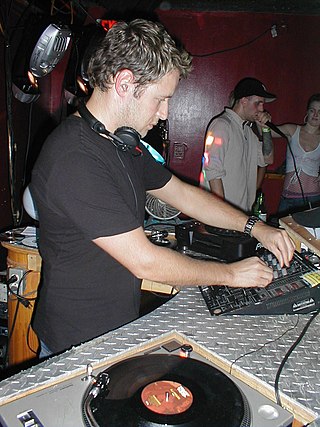
Drum and bass is a genre of electronic dance music characterised by fast breakbeats with heavy bass and sub-bass lines, samples, and synthesizers. The genre grew out of the UK's jungle scene in the 1990s.
Intelligent dance music (IDM) is a style of electronic music originating in the early 1990s, defined by idiosyncratic experimentation rather than specific genre constraints. It emerged from the culture and sound palette of electronic and rave music styles such as ambient techno, acid house, Detroit techno and breakbeat; it has been regarded as better suited to home listening than dancing. Prominent artists associated with it include Four Tet, Aphex Twin, Autechre, Squarepusher, Venetian Snares, Boards of Canada, Amon Tobin, Telefon Tel Aviv, μ-Ziq, the Black Dog, the Future Sound of London, and Luke Vibert.
Electronica is both a broad group of electronic-based music styles intended for listening rather than strictly for dancing and a music scene that came to prominence in the early 1990s in the United Kingdom. In the United States, the term is mostly used to refer to electronic music generally.
Sun Electric is a German electronic music group, hailing from Berlin. Their first release was the single "O'Locco" on the Wau! Mr. Modo label in 1990, with numerous subsequent releases on the R&S / Apollo labels throughout the following decade. According to Philipp Sherburne, Sun Electric initially released "straight-ahead Frankfurt trance, but by the mid '90s they were masters of elastic rhythms and silvery leads. Their albums Present and Via Nostra [...] are underrated masterpieces of late-'90s electronica." The band has been influential within techno, trance, ambient and intelligent dance music (IDM) genres.
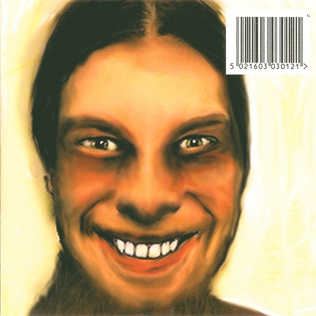
...I Care Because You Do is the third studio album by electronic musician Richard D. James under the alias Aphex Twin, released on 24 April 1995 by Warp. Containing material recorded between 1990 and 1994, the album marked James's return to a percussive sound following the largely beatless Selected Ambient Works Volume II (1994), and pairs abrasive rhythms with symphonic and ambient elements. The cover artwork is a self-portrait by James.
Digital hardcore is a fusion genre that combines hardcore punk with electronic dance music genres such as breakbeat, techno, and drum and bass while also drawing on heavy metal and noise music. It typically features fast tempos and aggressive sound samples. The style was pioneered by Alec Empire of the German band Atari Teenage Riot during the early 1990s, and often has sociological or far-left lyrical themes.

Richard D. James Album is the eponymous fourth studio album by British electronic musician Richard D. James, under his pseudonym Aphex Twin. In the United Kingdom, the album was released on 4 November 1996 through Warp Records. In the United States, it was released on 28 January 1997 by Sire Records, with the Girl/Boy EP included as bonus tracks. A reissue on vinyl was released on 18 September 2012.
Breakcore is a style and microgenre of electronic dance music that emerged from jungle, hardcore, and drum and bass in the mid-to-late 1990s. It is characterized by very complex and intricate breakbeats and a wide palette of sampling sources played at high tempos.

Body Electric is a collaborative album by ambient artists Steve Roach and Vir Unis. The music is a unique blend of smooth ambient textures, techno rhythms and various acoustic and natural recordings.

Ambient is the second studio album by American electronica musician Moby, released in August 1993 by record label Instinct.

Storm the Studio is the debut album by English electronic music group Meat Beat Manifesto, released on 20 February 1989 by Sweatbox Records in the United Kingdom and later that year by Wax Trax! in the United States. Recorded in three recording studios, the album contains four compositions, each split into separate parts, that mostly originated as twelve-inch singles the band released in 1988. The record's inventive musical style features elements of industrial music, electro, dub, noise rock and hip hop music, and incorporates breakbeats, noise and sporadic rap vocals. The group also incorporated heavy usage of sampling in a fashion they compared to pop art. Television was a further influence on the record, and numerous items of television dialogue appear throughout Storm the Studio as samples.
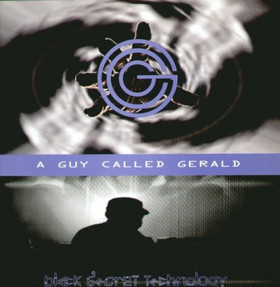
Black Secret Technology is the fourth album by UK electronic producer A Guy Called Gerald, released in February 1995 to widespread critical acclaim. It has since been described as the best jungle album of all-time by publications such as Fact, Pitchfork and Freaky Trigger.
Apollo Records is an ambient-music subdivision of R&S Records of Belgium.

Ginger is the debut studio album by Dutch electronic music producer Speedy J. Released via a joint deal between Plus 8 and Warp in September 1993, the album was the sixth release in Warp's Artificial Intelligence series, which focused on "electronic listening music" by different artists. It peaked at number 68 on the UK Albums Chart and remains Speedy J's most successful album there.
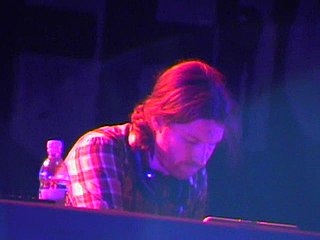
Richard David James, best known as Aphex Twin, is an Irish-born British musician, composer and DJ. He is known for his idiosyncratic work in electronic styles such as techno, ambient, and jungle. Journalists from publications including Mixmag, The New York Times, NME, Fact,Clash and The Guardian have called James one of the most influential and important artists in contemporary electronic music.
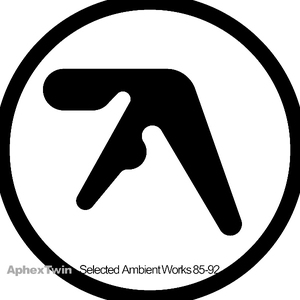
Selected Ambient Works 85–92 is the debut studio album by Aphex Twin, the pseudonym of British electronic musician Richard D. James. It was released on 9 November 1992 through Apollo Records, a subsidiary of Belgian label R&S Records. The album consists of ambient techno tracks recorded onto cassette reputedly dating as far back as 1985, when James was thirteen to fourteen years old. Upon release it received widespread acclaim. It entered the UK Dance Albums Chart at No. 6 on 26 December 1992.
Drill 'n' bass is a subgenre of drum and bass which developed in the mid-1990s as IDM artists began experimenting with elements of breakbeat, jungle, and drum and bass music. Artists utilized powerful audio software programs and deployed frenzied, irregular beats that often discouraged dancing. The style was often interpreted as having a lightly parodic relationship with the dance styles that inspired it.

One is the debut studio album by English experimental electronic producer Req, recorded from September 1995 to 1996 and released on Skint Records in 1997. After releasing several EPs, Req decided to release an album to spread his sound. His conception for One was to create music that hints at a direction without ever arriving at one. Music critics had difficulty defining the album's style, and is seen as a "blunted take" on trip hop with downtempo ambience. The album was well received by critics, who praised its unique sound and production. Today, it is seen as a predecessor to the late 1990s' "intelligent big beat" of fellow Skint artists such as Lo-Fidelity Allstars, and in 2015, Fact named the album the 14th greatest trip hop album of all time.

Emit Ecaps is the third album by English techno producer Jonah Sharp under his pseudonym Spacetime Continuum. It was released in February 1996 on Reflective Records in the United Kingdom and on Astralwerks in the United States. After establishing himself as a techno producer but then moving to an ambient style on his previous album Sea Biscuits (1994), Sharp's music on Emit Ecaps balances his techno and ambient styles with influences of drum and bass and jungle music. The name of the album reverses the term 'space time'. Emit Ecaps was a radio success and received acclaim from music journalists who praised Sharp's change in direction. The album was followed in November 1996 by Remit Recaps, a remix album of material from Emit Ecaps, created with the involvement of several producers.












